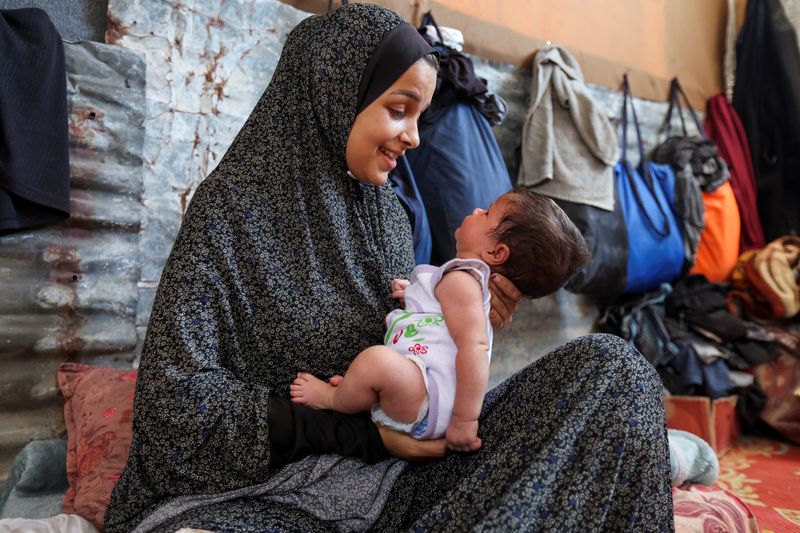By Ramadan Abed
DEIR AL-BALAH, Gaza (Reuters) – Gazan mom Rana Salah cradles her one-month-old daughter Milana in her arms in a sweltering tent for the displaced, and speaks of the guilt she feels for bringing her little one right into a world of struggle and struggling.
“If it were up to me, I wouldn’t have gotten pregnant or given birth during the war because life is completely different; we’ve never lived this life before,” she stated, talking at a camp in Deir al-Balah within the central Gaza Strip.
“I gave birth twice before, and life was better and easier for me and the child. Now, I feel like I’ve wronged both myself and the child because we deserve to live better than this.”
Milana was born in a hospital tent by caesarean owing to issues with Salah’s being pregnant. The household haven’t been capable of return residence as a result of battle, shifting as an alternative from one tent to a different.
Milana is certainly one of round 20,000 infants to have been born in Gaza within the final 12 months, in line with UNICEF statistics.
The present struggle, a very lethal episode within the decades-old Israeli-Palestinian battle, was triggered on Oct. 7, 2023, when Hamas militants attacked Israel, killing 1,200 individuals and taking about 250 hostages, in line with Israeli tallies.
Israeli air and artillery strikes in response have lowered a lot of the Palestinian enclave to rubble and greater than 41,500 Palestinians have been killed within the Israeli assault, in line with the Gaza well being ministry. Most of Gaza’s 2.3 million residents have been displaced.
INFECTION RISK
Salah followers Milana with cardboard and says the warmth is unhealthy for the child’s pores and skin.
“Instead of returning to our house, we keep moving from one tent to another… where diseases are widespread and the water is contaminated.”
The World Well being Group (WHO) has stated postnatal providers have decreased considerably in Gaza, so ladies who’ve issues have much less entry to the care they want, as do their infants.
Rick Brennan, the WHO’s Japanese Mediterranean Regional emergency director, stated malnutrition was a risk to newborns, significantly if their moms have been unable to breastfeed, as there was no entry to breast milk substitutes.
Displacement and being continuously on the transfer are disruptive for a new child and expose them to dangers of an infection, he stated.
Manar Abu Jarad is staying in a faculty shelter run by the U.N. Palestinian refugee company (UNRWA). Her youngest daughter Sahar was born on Sept. 4th, additionally by caesarean part. Her husband was killed within the struggle.
On listening to she would wish a caesarean for the start, she frightened about how she would look after her different youngsters.
“I already have three girls. I started shouting… How can I carry (water) buckets? How can I bathe my daughters? How can I help them and my husband is not with me, he was martyred.”
Youngsters rock child Sahar, who’s swaddled in a crib, subsequent to Jarad.
“I’ve reached the point where I cannot carry the responsibility for this girl … Thank God I found some help here,” she stated. She has borrowed what she will be able to from household and makes use of one diaper a day for the child as she will be able to’t afford extra.
“I don’t have the money to provide diapers or milk for her.”

Jarad longs for an finish to the struggle and a return to her residence, even whether it is only a tent subsequent to her former residence.
“The important thing is to go home. Enough of all the exhaustion we are experiencing here, enough carrying buckets, enough of the dirt in the bathrooms. It’s really, really hard and really tiring for us. Diseases are everywhere.”




